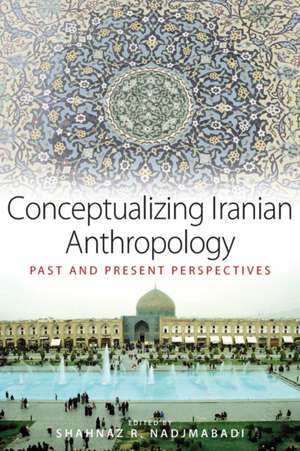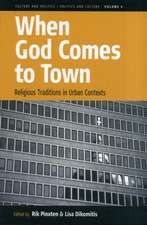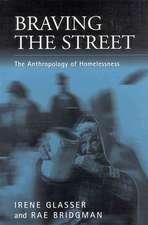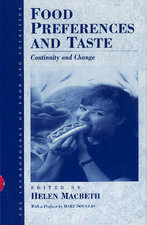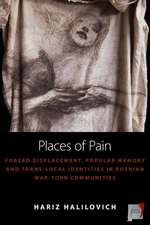Conceptualizing Iranian Anthropology
Editat de Shahnaz R. Nadjmabadien Limba Engleză Paperback – 31 mai 2012
This book... is certainly an indispensable tool for anyone interested in anthropological research on the country. Essays are accompanied by bibliographies that often contain hidden or forgotten treasures. A comprehensive bibliography of anthropological studies of Iran in English collated by Hegland completes the book. JRAI
During recent years, attempts have been made to move beyond the Eurocentric perspective that characterized the social sciences, especially anthropology, for over 150 years. A debate on the "anthropology of anthropology" was needed, one that would consider other forms of knowledge, modalities of writing, and political and intellectual practices. This volume undertakes that challenge: it is the result of discussions held at the first organized encounter between Iranian, American, and European anthropologists since the Iranian Revolution of 1979. It is considered an important first step in overcoming the dichotomy between "peripheral anthropologies" versus "central anthropologies." The contributors examine, from a critical perspective, the historical, cultural, and political field in which anthropological research emerged in Iran at the beginning of the twentieth century and in which it continues to develop today.
Shahnaz R. Nadjmabadi is a social anthropologist, who worked at UNESCO in Paris from 1977 to 1984. She is a Senior Research Fellow at the Department of Anthropology at the Eberhard Karls Universität, Tübingen (Germany) and a member of the Competence Network Crossroads.
| Toate formatele și edițiile | Preț | Express |
|---|---|---|
| Paperback (1) | 261.38 lei 6-8 săpt. | |
| BERGHAHN BOOKS INC – 31 mai 2012 | 261.38 lei 6-8 săpt. | |
| Hardback (1) | 751.71 lei 6-8 săpt. | |
| BERGHAHN BOOKS INC – 31 oct 2009 | 751.71 lei 6-8 săpt. |
Preț: 261.38 lei
Nou
Puncte Express: 392
Preț estimativ în valută:
50.03€ • 54.36$ • 42.05£
50.03€ • 54.36$ • 42.05£
Carte tipărită la comandă
Livrare economică 21 aprilie-05 mai
Preluare comenzi: 021 569.72.76
Specificații
ISBN-13: 9780857456519
ISBN-10: 0857456512
Pagini: 286
Dimensiuni: 152 x 229 x 15 mm
Greutate: 0.39 kg
Editura: BERGHAHN BOOKS INC
ISBN-10: 0857456512
Pagini: 286
Dimensiuni: 152 x 229 x 15 mm
Greutate: 0.39 kg
Editura: BERGHAHN BOOKS INC
Notă biografică
Shahnaz R. Nadjmabadi is a social anthropologist, who worked at UNESCO in Paris from 1977 to 1986. She is a Research Fellow and Lecturer at the Department of Anthropology at the Johann Wolfgang Goethe-Universitat, Frankfurt/Main. Her research focuses on the interrelationships between the populations living in the Iranian coastal areas and their neighbours in the Arab countries of the Persian Gulf. She has published a number of articles on questions of identity, locality and the history of settlement in the province of Hormozgan (Persian Gulf).
Cuprins
Introduction Shahnaz R. Nadjmabadi PART I: FROM FOLKLORE TO ANTHROPOLOGY: THE PASSAGE Chapter 1. The Contribution of Foreign Anthropologists to Iranology Ali A. Bulookbashi Chapter 2. Storytelling as a Constituent of Popular Culture: Folk Narrative Research in Contemporary Iran Ulrich Marzolph Chapter 3. Iranian Anthropology - Crossing Boundaries: Influences of Modernization, Social Transformation and Globalization Mary Elaine Hegland PART II: VOICES FROM WITHIN: INSTITUTIONS AND PROFESSIONS Chapter 4. Anthropology in Post-revolutionary Iran Nematollah Fazeli Chapter 5. Making and Remaking an Academic Tradition: Towards an Indigenous Anthropology in Iran Nasser Fakouhi Chapter 6. Iranian Anthropologists Are Women Soheila Shahshahani PART III: ANTHROPOLOGICAL PRACTICE: CONSTRAINTS AND POSSIBILITIES Chapter 7. Applied Anthropology in Iran? Jean-Pierre Digard Chapter 8. Past Experiences and Future Perspectives of an Indigenous Anthropologist on Anthropological Work in Iran Mohammad Shahbazi Chapter 9. Anthropological Research in Iran Lois Beck Chapter 10. Being from There: Dilemmas of a 'Native Anthropologist' Ziba Mir-Hosseini PART IV: PAST AND PRESENT PERSPECTIVES: CHALLENGING THE FUTURE Chapter 11. Usual Topics: Taboo Themes and New Objects in Iranian Anthropology Christian Bromberger Chapter 12. Islamophobia and Malaise in Anthropology Fariba Adelkhah Chapter 13. Personal Reflections on Anthropology of and in Iran Richard Tapper Select Bibliography Notes on Contributors Index
Recenzii
"In all, these useful and informative articles assess the status of anthropology of/in Iran realistically, even candidly - [They] reflect the cautiously optimistic attitude at the time of the conference, a hopefulness that meanwhile has withered - [and] illustrate the difficulties of transplanting a young social science based on humanism and curiosity (rather than pragmatism) to a society that is distrustful of intellectual pursuits deemed as potentially dangerous to an authoritarian state."* Anthropos "The authors present an incisive and illuminating overview of Iranian anthropology - Despite [considerable] difficulties, the authors uniformly demonstrate a reflexive, ethically responsible, and politically aware anthropology and offer valuable insights about the greater emphasis on problem-focused research by Iranian anthropologists and the potential for a valuable future role for applied anthropology in Iran." * Choice "This book - is certainly an indispensable tool for anyone interested in anthropological research on the country. Essays are accompanied by bibliographies that often contain hidden or forgotten treasures. A comprehensive bibliography of anthropological studies of Iran in English collated by Hegland completes the book." * JRAI
